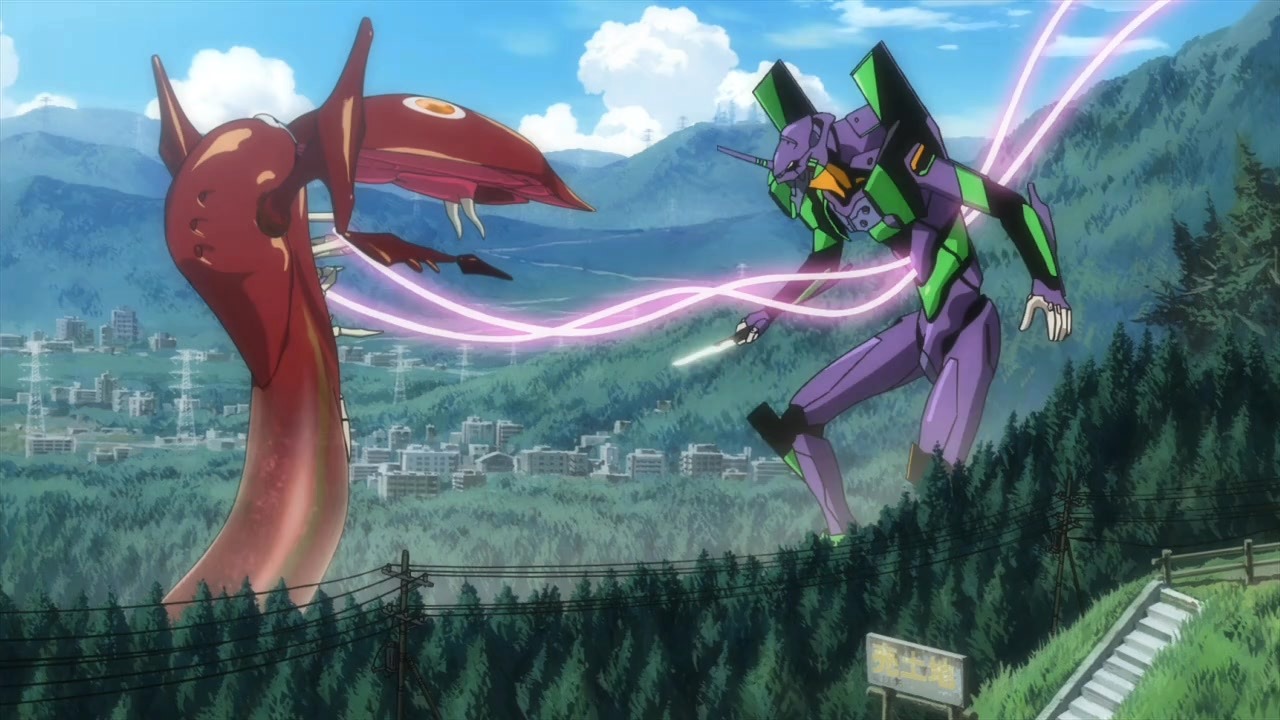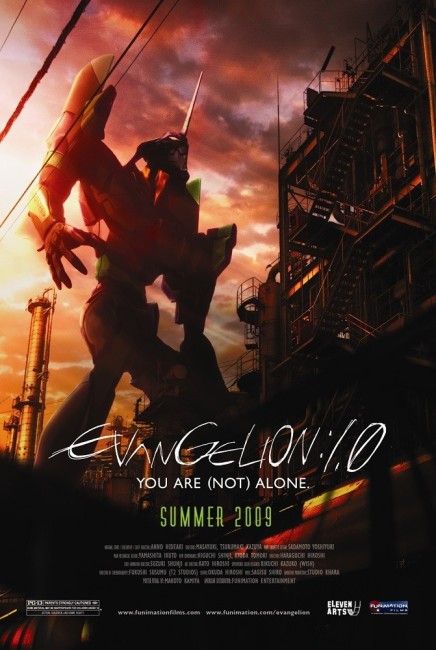(Evangelion Shin-Geki Jo Ban)
Crew
Directors – Masayuki & Kazuya Tsurumaki, Screenplay – Hideaki Anno, Producer – Toshimichi Otsuki, Photography – Tohru Fukushi, Music – Shiro Sagisu, Art Direction – Hiroshi Kato & Tatsuya Kushida. Production Company – Gainax/Khara Corporation.
Plot
Most of the world has been destroyed by vast, near indestructible machines of unknown origin that have been nicknamed Angels. Misato Katsuragi takes young teenager Shinji Ikari to the headquarters of NERV, the agency in charge of Earth’s defence against the Angels. There Shinji learns that the father he never particularly knew is one of the scientists. His father has built an Evangelion, a vast robotic machine that he has designed to be piloted by Shinji in the attack back against the Angels. Shinji is successful in piloting the Evangelion to stave off one attack but quits, not liking doing so. He is placed together with Rei Ayanami, the original pilot of the Evangelion who was injured in combat. A vastly more powerful Angel starts drilling towards the underground headquarters of NERV. Unless all effort can be mounted in the fight back and Rei can persuade Shinji to return to the pilot’s seat, this could mean the end of the world.
The Evangelion saga is one of the most popular in the history of modern Japanese Anime. The saga started out as the anime tv series Neon Genesis Evangelion (1995-6), which consisted of a single season of 26 episodes. The series, which developed a complex mythology, was set in the aftermath of a massive disaster where the Earth had been devastated by the alien Angels. The agency NERV recruited various young people, including Shinji Ikari and Rei Ayanami, to pilot Eva, giant-sized mecha, the only weapons capable of combating the Angels. Around the same time, there was also a very successful manga, which is still being published, and a series of videogames.
Following the end of the series, creator Hideaki Anno oversaw two film spinoffs Evangelion: Death and Rebirth (1997) and The End of Evangelion (1997). Evangelion 1.0: You Are (Not) Alone was part of a modern reboot of the franchise that retold the original as a four-part film saga – if one waits way past the end of the credits, there even comes a trailer for the sequel. It was followed by Evangelion 2.0: You Can (Not) Advance (2009), Evangelion 3.0: You Can (Not) Redo (2012) and Evangelion: 3.0+1.0 Thrice Upon a Time (2021). There have also been plans announced for a live-action Evangelion film.
I was at a distinct disadvantage in watching Evangelion 1.0: You Are (Not) Alone in a theatrical setting, having not seen any of the previous works in the series. Even though it is a reboot of the franchise, Evangelion 1.0 is made with a good many references and assumptions based on the pre-existing storyline. In other words, it is a film that is made for the fanbase who are familiar with the material, not as a work designed to invite new people into the world. The effect is akin to sitting down halfway through the middle of the film and trying to work out what is going on from that. You Are (Not) Alone, for instance, opens with the world apparently devastated, the NERV agency well established and human cities hiding beneath the ground to emerge into the daylight again when all is clear.

What is missing in all of this is an explanation of the background. It is not ever made clear what caused this devastation – you gradually work out that it is to do with the Angels – but nothing is ever directly mentioned. For that matter, it is not even clarified as to what the Angels are – for some part of the film, I sat in confusion as to whether these were meant to be angels in the heavenly sense or if this was a term being used to refer to alien entities. I gather the latter as the film never deigns to explain anything at all about what the Angels are. The reasons why young Shinji is chosen to pilot the Evangelion and the complicated relationship with his absent father are not very clear either.
This need not be a problem, but I also found it hard to get into Evangelion 1.0 on its own terms. There is not much to the plot and when there are not the action scenes to keep the film going, proceedings tend to slow right down. There are various scenes with the young hero Shinji’s relationships with the two women of the show but neither of these are particularly exciting. There is one scene where he gets out of the shower and sees a penguin and stands around talking to Misato before realizing he is naked; another where he enters Rei’s apartment and contrives to fall on top of her after she emerges from the shower naked. Quite how this obsession with placing the hero into embarrassing unclothed situations with the opposite sex advances the plot is not clear at all. Later in the show, we get several scenes where Shinji is adamant about not getting back into the Evangelion and is eventually persuaded back by Rei. These make for a good character arc, but are brought out too late in the game and with not nearly enough time devoted to them.
Certainly, Evangelion 1.0: You Are (Not) Alone can be enjoyed on the level of pure spectacle, as is always the case with all good anime. There is a good opening scene with the NERV missiles fighting back against the angel, destroying half the city in the process. Or scenes where Rei goes amok in her Eva, smashing about in a laboratory, before ejecting in a slim pod; or the emergence of the cities again from safety beneath the ground. However, the best parts of the film are the massive climactic combat scenes between the pyramid-shaped Angel and Shinji and Rei in their power suits, wielding a vast weapon that unites all the electricity in Japan as the Angel melts entire mountains with its energy.
Subsequent to this, director Hideaki Anno branched out into live-action with Shin Godzilla/Godzilla: Resurgence (2016), as well as wrote/produced the big-screen reboot of Shin Ultraman (2022) and directed/wrote the big-screen reboot of Shin Kamen Rider (2023).


